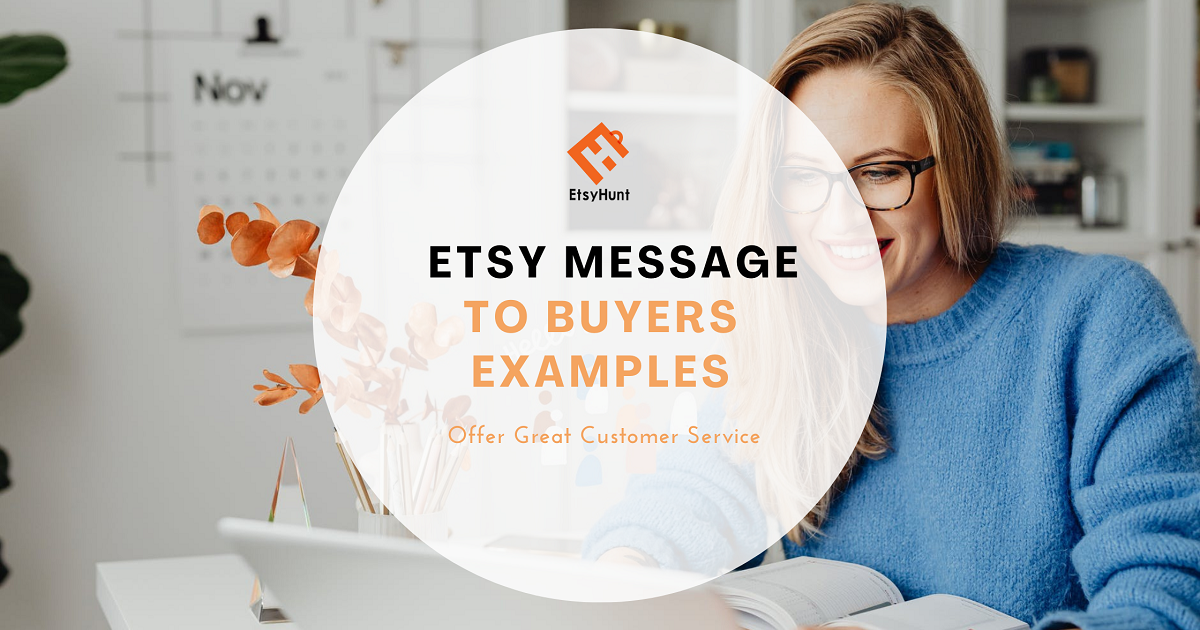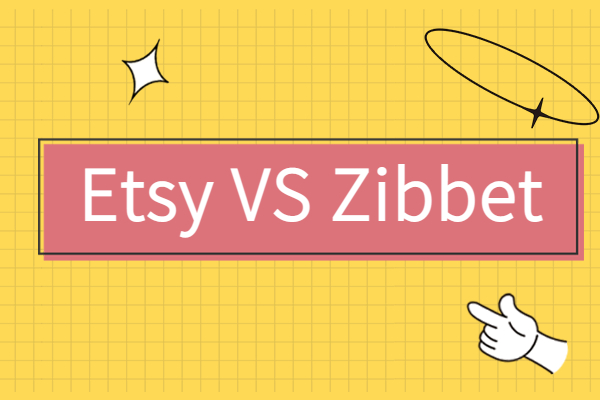18 Sites Like Etsy——Top Etsy Alternatives for Sellers in 2026
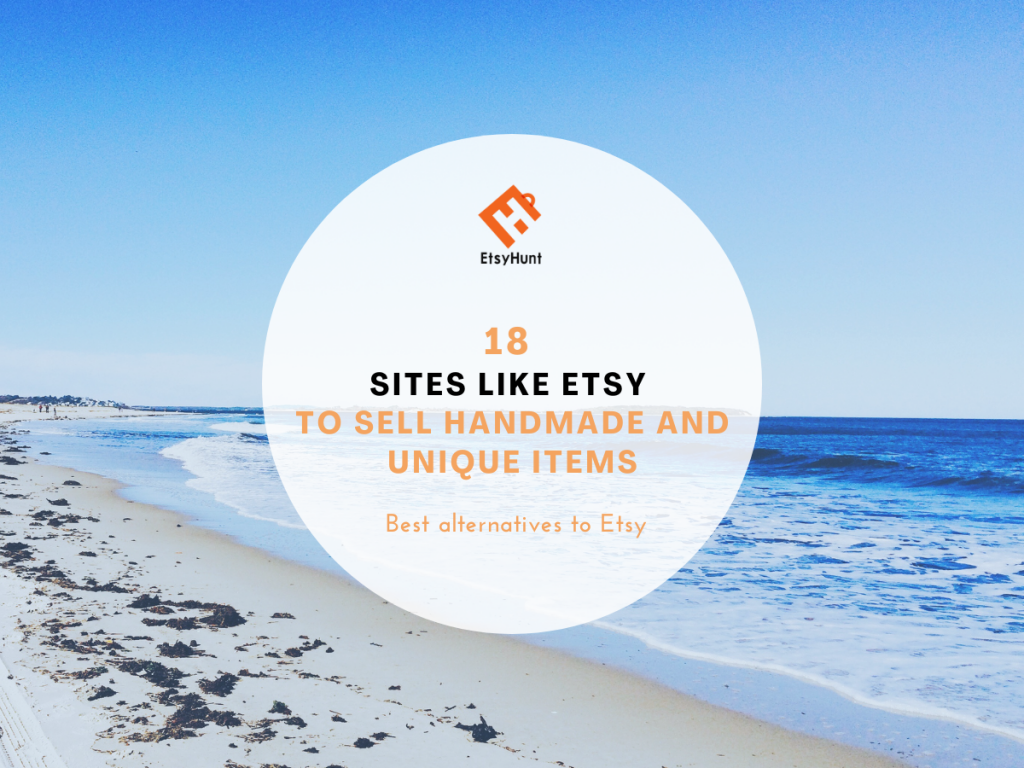
Sites like Etsy are gaining attention as many sellers realize that, despite Etsy’s long-standing dominance in handmade and vintage goods, the platform comes with limitations such as fees, restricted shop design, and fierce competition. If your shop isn’t performing as hoped, exploring alternatives may help.
Overview of 18 Similar Sites Like Etsy
| Sites | Best for | Price |
| Amazon Handmade | The widest customer reach; Built-in fulfillment |
15% commission |
| Big Cartel | Built for artists and creators; Low startup cost; Custom domain support |
Free (limited features) |
| Storenvy | Combines store + marketplace; Customizable storefront; Social shopping features |
Free plan for your customizable store; 15% commission for marketplace sales |
| Shopify | Full control over your store; Highly customizable; Multiple payment options |
Subscription Fee: $29 /month + |
| Bonanza | Easy to import from eBay / Etsy; Seller-friendly policies |
No listing fee(up to 50 items); Account setup fee:$14.99; Extra $0.25 per order (for free sellers) |
| Society6 | Global marketplace exposure; Focus on art & design |
No listing fees; sellers earn a fixed royalty |
| IndieCart | Multiple selling formats; | Monthly subscription fee of $7.50 |
| RubyLane | Target audience that values quality and uniqueness |
Monthly Maintenance Fee: $45/month; Service Fee on Sales |
| Folksy | Low‑cost entry; Seller control & simplicity |
Two main account types: Basic (pay‑as‑you‑ go) and Plus (subscription) |
| Depop | Fashion‑focused community & global reach; flexibility in shipping and pricing |
No listing fees for many sellers in US & UK; payment processing fees: 3.3% + $0.45 per transaction |
| Redbubble | Print‑on‑demand + fulfillment | No upfront fees or listing fees; Platform / markup fee |
| Aftcra | “Made in USA” focus; | Commission on sale: 7%; |
| Artful Home | Professional exposure & marketing support; freedom to price your own work & control presentation |
50% of the sale price |
| eBay | Huge global reach and buyer base; Flexible selling formats |
Final value fee rates are around 12.9% to 15% of the total sale amount; per-order fee: $0.3/$0.4 |
| Zazzle | Print‑on‑demand + fulfillment; large, ready-made marketplace |
After-sale earnings = base cost + your royalty |
| UncommonGoods | Curated, quality‑focused marketplace; Ethical / sustainable / artisan‑friendly values |
No listing or submission fees |
| Spoonflower | Print‑on‑demand + no inventory hassle; | No listing or subscription fees; earn from your royalty |
| Icraftgifts | Strictly handmade marketplace | One‑time registration fee: $25; monthly subscription fee: $5-$15 |
Top 18 Etsy Alternatives to Sell Handmade, Vintage and Unique Items
Top 5 Sites Like Etsy to Sell Handmade, Vintage and Unique Items
Whatever the reason, it would be wise to take a closer look at Etsy alternatives in this challenging business arena. This section will introduce the 5 best sites like Etsy and outline their advantages and disadvantages.
1. Amazon Handmade
Launched in 2015, this platform of Amazon allows only artisans to show their unique talent upon getting approval. With by far the largest audience in the eCommerce world, Amazon Handmade is the most challenging rival of Etsy.
This giant business player generally partners with micro-businesses so that it provides them with the opportunity to get bigger and monitor their potential. In this regard, it will be vital to touch upon the pros and cons of Amazon Handmade to better understand its distinct role of it.
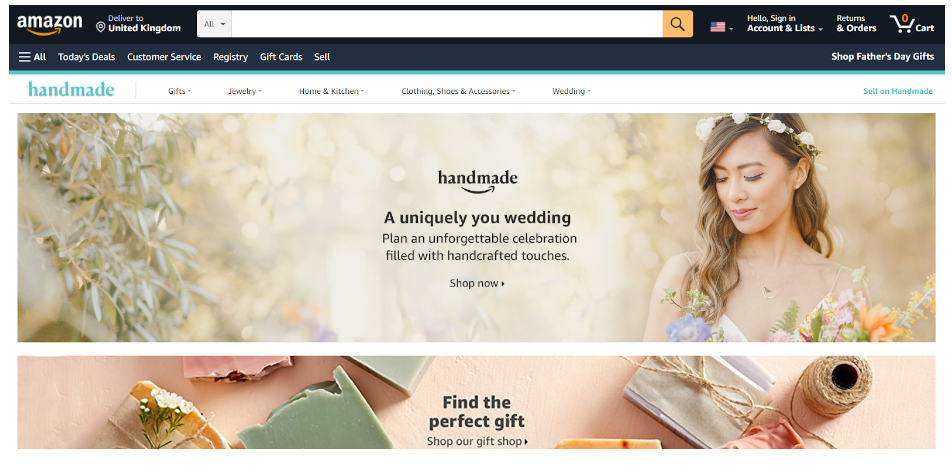
Pros and Cons
| Pros | Cons |
| Millions of customer reach | Lenient return policies burden sellers |
| Full Amazon logistics support | High 15% commission reduces profit margins |
| Free store setup and listings | Require a great deal of SEO work at first |
| High ROI from Amazon ads | Fewer product categories than Etsy |
💡 Good to Know: Amazon Handmade vs. Etsy: How Similar or Different Are They?
Amazon Handmade Product Tool
If you decided to launch a store on Amazon Handmade but you are unsure of what to sell, do not worry because EHunt will assist you.
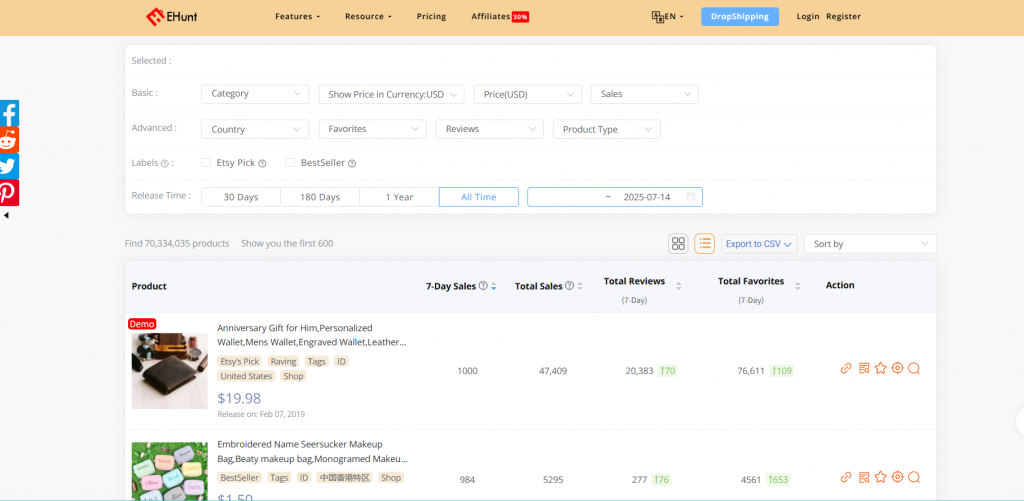
Amazon US Handmade Products tool will definitely give the perfect edge over the competitors in this challenging arena. It allows you to compare time, specify estimated sales, provide total reviews and more. It is ideal to have full control over the items without missing any details. Give it a try:)
2. Big Cartel
Big Cartel is one of the best sites like Etsy. Founded in the same year as Etsy, it is a store builder designed for artisans and creatives who want to sell their artwork online. It supports customizable website templates to match the brand style and allows sellers to list up to 5 products for free, making it ideal for artists with a small number of items and a limited budget.
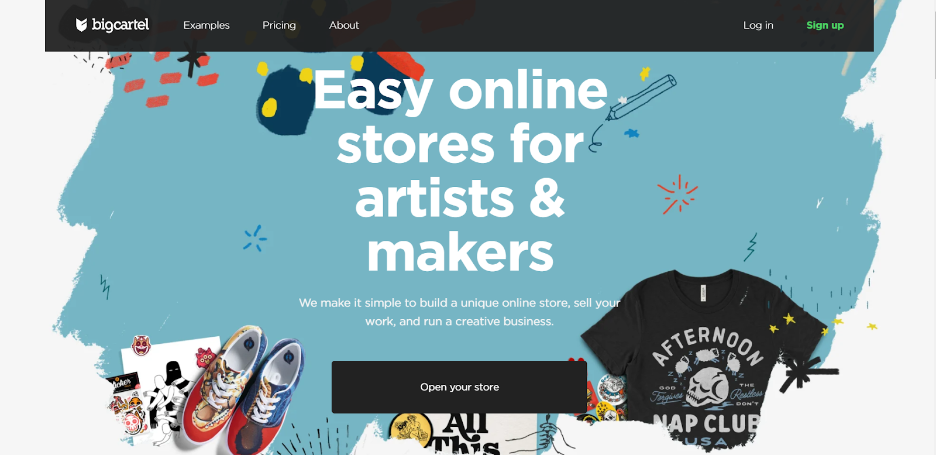
Pros and Cons
| Pros | Cons |
| Provide a free plan | Not suitable for large-scale sellers |
| Custom domain and website templates | Fewer advanced features for SEO strategies and store customization |
| Support Google Analytics and inventory tracking | Customer support is relatively weak |
Potential sellers on both platforms can explore the key parameters to help decide which is preferable. Big Cartel vs Etsy comparison gives you the full picture.
3. Storenvy
Another great alternative to Etsy with over 67.000 brands selling their goods is Storenvy. High-quality products are what sellers on the platform say they sell and, interestingly, the average sale price is higher than that of Etsy’s. Storenvy is a hybrid platform that lets you create a fully customizable store to showcase your products, while also listing them in a central marketplace.
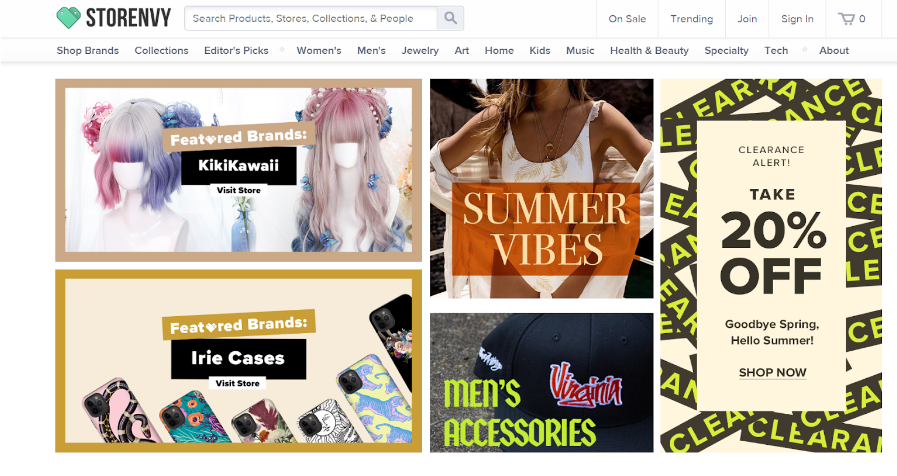
Pros and Cons
| Pros | Cons |
| No listing fee | Lower traffic compared with Etsy |
| Customizing your own storefront in the way you want | Limited functions |
| Support a product with multiple sizes and varying prices | The central marketplace charges a commission |
💡 A Must-read: Etsy vs Storenvy: Which One is Friendly to Handmade Products
4. Shopify
Shopify is a leading e-commerce platform that enables individuals and businesses to create and manage their online stores effortlessly. It offers a wide range of customizable templates, integrated payment solutions, and powerful marketing tools, making it ideal for both beginners and experienced sellers looking to grow their business online.
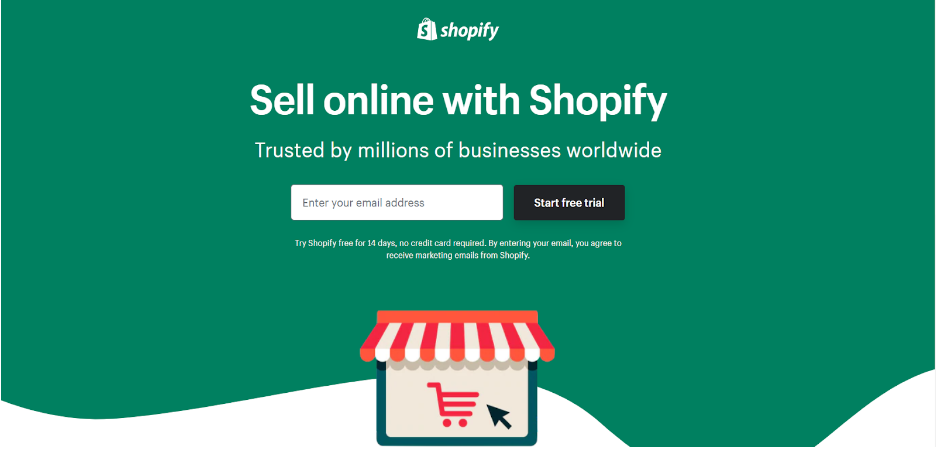
Pros and Cons
| Pros | Cons |
| Beginner-friendly, no coding required | A transaction fee per sale |
| Full control over your store | No built-in traffic; require marketing to attract buyers |
| Hundreds of store themes and full design customization | Greater store management skills required |
| Built-in tools for email marketing, discount codes, and SEO |
5. Bonanza
Bonanza is an online marketplace that allows sellers to list a wide variety of products with ease. It offers simple store setup, low fees, and tools to help sellers reach buyers, making it a user-friendly alternative for those looking to expand beyond platforms like Etsy. You can run your own store and list on Bonanza’s marketplace at the same time.
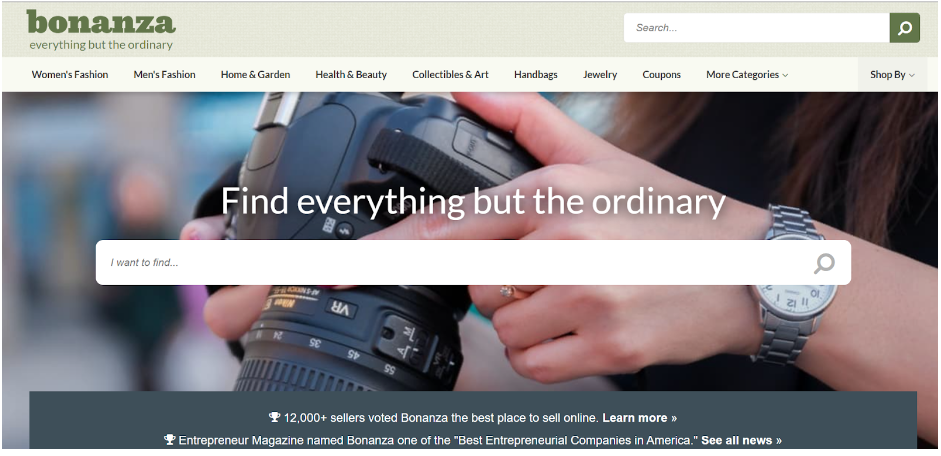
Pros and Cons
| Pros | Cons |
| Import listings from Etsy, eBay, or Shopify | Limited customization |
| Flexible pricing strategy | Less user-friendly |
| Free to list products (no upfront cost) |
13 Other Sites Like Etsy to Sell Crafts
Beyond the top 5 Etsy alternatives, there are 13 other sites that offer valuable opportunities for craft makers, artists, and digital-product sellers. These sites provide strong potential for visibility, sales, and brand growth, helping sellers diversify their presence and reach audiences that may not be active on larger marketplaces.
6. Society6
Society6 is a print-on-demand marketplace where artists can sell their work on products like prints, home décor, clothing, and accessories. The platform is known for supporting artist earnings and creative freedom, while handling all production and shipping so creators can easily monetize their designs.
Society6 is easy to set up, offers strong profit margins for artists, and attracts a niche audience that values high-quality, artist-made products. At the same time, Society6 sellers face intense competition.
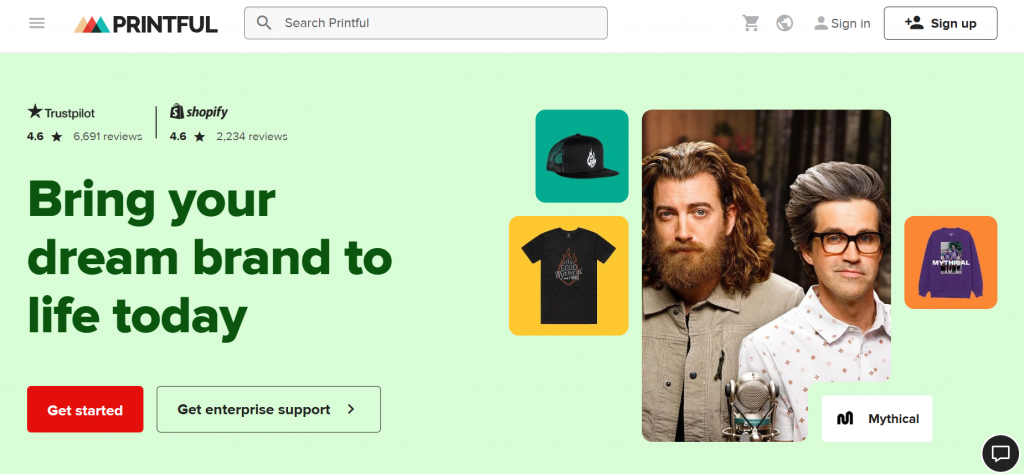
7. IndieCart
With 16.000 registered sellers with handmade items, it is an alternative platform to Etsy. Sellers do not have to pay for listing or commissions received upon sale. However, a monthly payment of $7.50 is required.
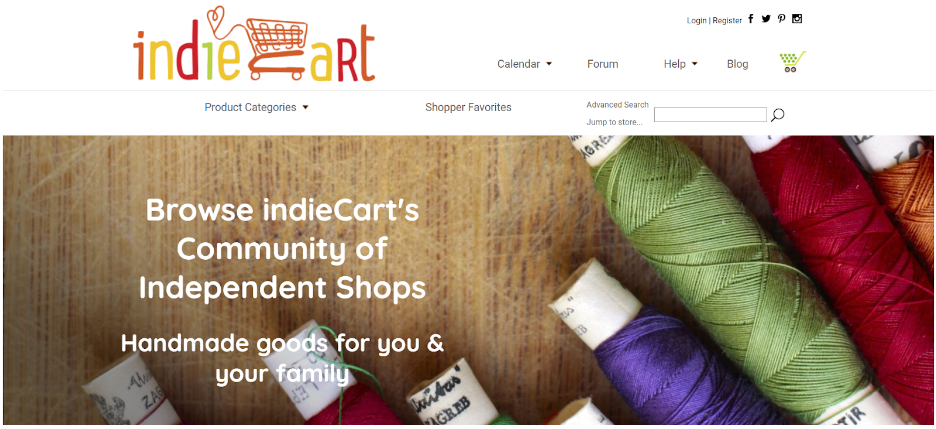
Here are some important features that make IndieCart special:
- Selecting how you sell
- Choosing the currency to make sales
- Setting up your own categories and subcategories
- Listing for free
- Blacklisting some buyers
- Facebook integration completed:)
- Specifying a date for the items to be in stock
8. RubyLane
It is one of the most favorable sites like Etsy in terms of vintage items and handcrafted goods. Those wanting to promote their brands that have old-school style are welcomed here to present their unique products.
RubyLane is famous for its highly targeted audience, quality ıtems, and vetted sellers. Because vintage has been their core business since 1998. That makes it attractive for vintage and handmade items Sellers.
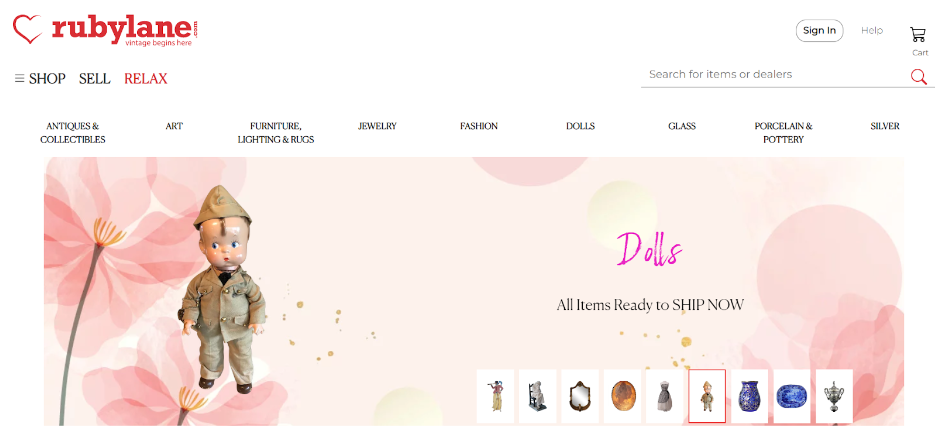
The setup and listing are free on RubyLane.
However the monthly maintenance fee ( $25) sellers on RubyLane have to submit is higher than any other platform, posing a significant challenge to sellers. Besides, if you add at least 15 items during the month, you will not pay a monthly fee.
Furthermore, there is a service fee of 9.9% based on the Purchase Order total (which does not include Sales Tax), capped at $250. Visit RubyLane pricing for further info.
9. Folksy
Known as the UK’s biggest online craft fair, Folksy enables genuine artists and buyers wishing to shop directly from artisans to get together. Unlike Etsy, this marketplace does not allow either reselling of an item or vintage sales.
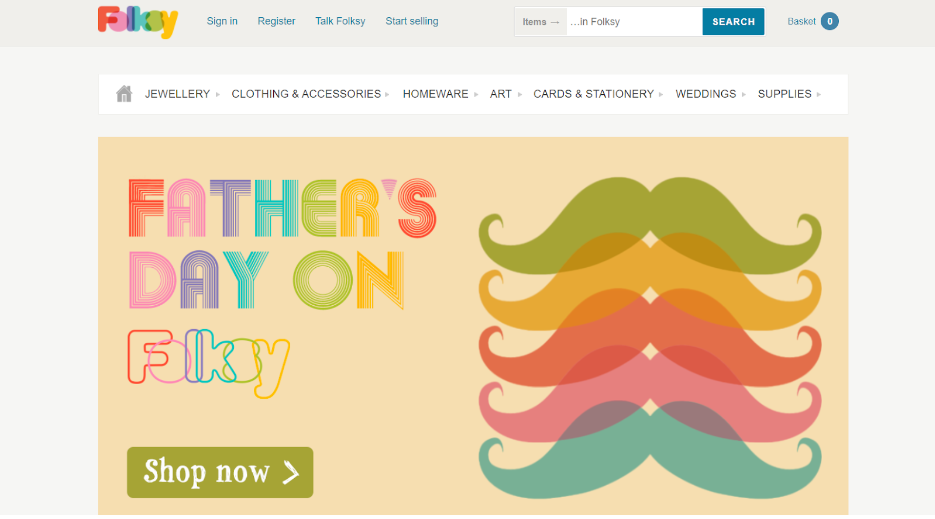
As for the pricing policy of Folksy, there are 2 plans: Basic and Plus. Sellers are charged £0.15 + VAT per item quantity on the Basic plan and a listing fee is required after the first 3 listings.
Likewise, Folksy Plus costs £5 monthly. Those having an Etsy store can import all the data at the touch of a button using Folks Plus.
Another significant factor that should be taken into consideration is that Folksy does not hold on to sellers’ money. Thus, Sales go immediately into sellers’ PayPal or Stripe accounts.
10. Depop
Depop is a mobile marketplace where users buy and sell secondhand, vintage, and handmade fashion, combining social media features with e-commerce to reach trend-focused audiences.
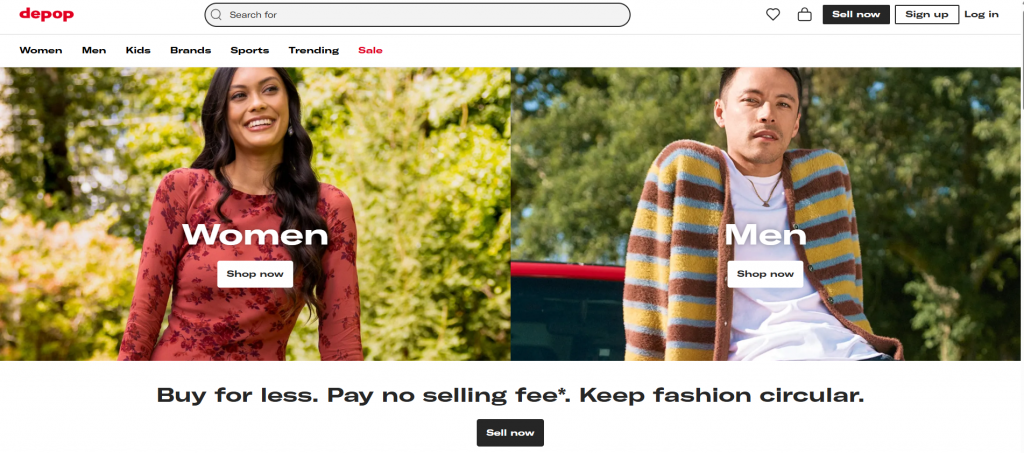
Depop charges a 10% selling fee on each item, plus a payment processing fee of 3.3% + $0.45 per transaction. It is ideal for e-commerce fashion store owners and sellers who want to build a community and cultivate relationships with loyal buyers.
11. Zazzle
Designers and DIY creatives are the artisans here on this platform looking to sell their items crafted with creativity and imagination. There is even an Ideas section for shoppers to provoke inspiring thoughts, which is perfectly fine.
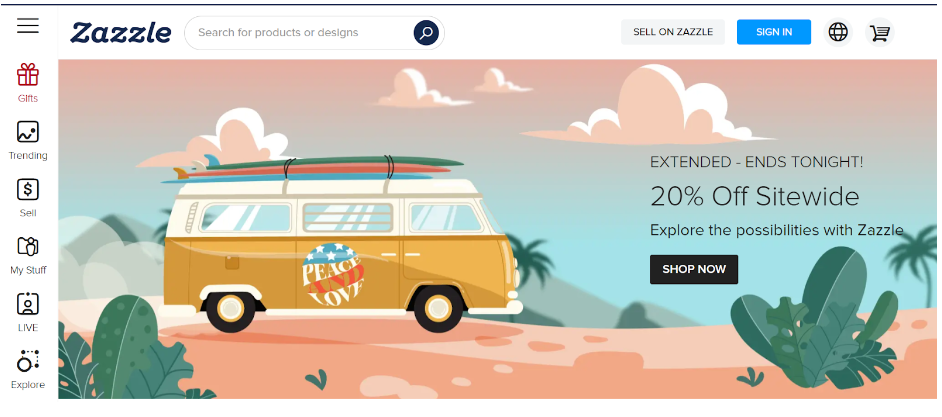
Moreover, Zazzle enables you to earn money in 3 ways:
Creator: Sell your artwork on items in the marketplace
Maker: Manufacture physical goods and sell them
Associate: Promote Zazzle through sharing links.
When it comes to seller fees, the standard Zazzle commission rate is 15% per sale, plus up to a 17% volume bonus.
12. Aftcra
This is one of the US sites like Etsy and plays a vital role in defining what a handmade item is or looks like. Aftcra has a large selection of categories and market search is at the heart of the management of the store.
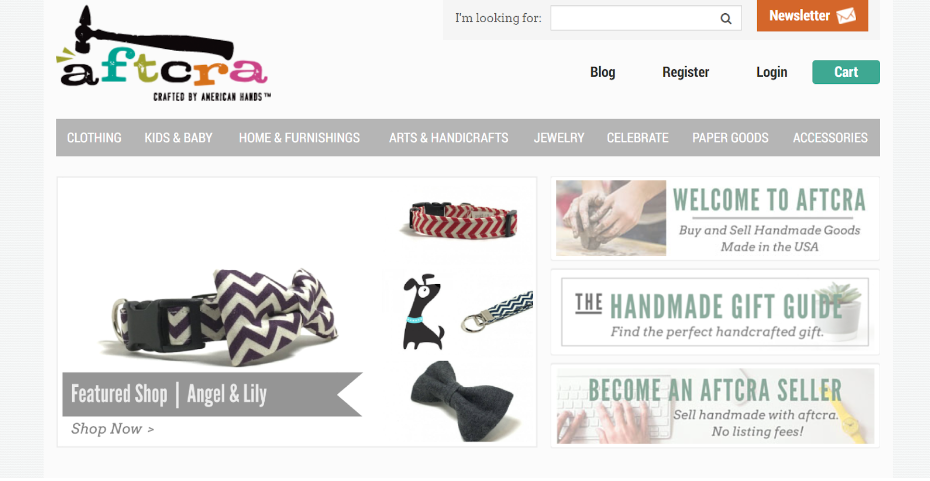
There will be no listing fees when you list a number of items nor permission to resell items or sell vintage items. All products are listed for 6 months. Once your product sells there will be a 7% transaction fee. Besides, it is not allowed to list any products under the price of $10.
The platform has an Etsy Importer tool allowing sellers to import data as soon as possible. ⚠However, Aftcra is limited to artists living in America.⚠️
13. Redbubble
Redbubble is a unique marketplace for independent artists and it has a wide range of items from phone cases to home decor. Redbubble’s motto has always been uncommon designs on awesome stuff.

The platform has a base price system in which every time the product is sold, they charge the base price, and the rest is all left to sellers. In addition, there is no listing and setup fee. Visitors to Redbubble always have some items they can find especially based on the reviews.
14. Artful Home
It is an amazing marketplace specifically for those passionate about wall art, sculptures, jewelry, ornaments, etc. What makes it distinct from others is that sellers have to be approved by a jury composed of members of the community. It takes 12-14 weeks to be approved by the jury.
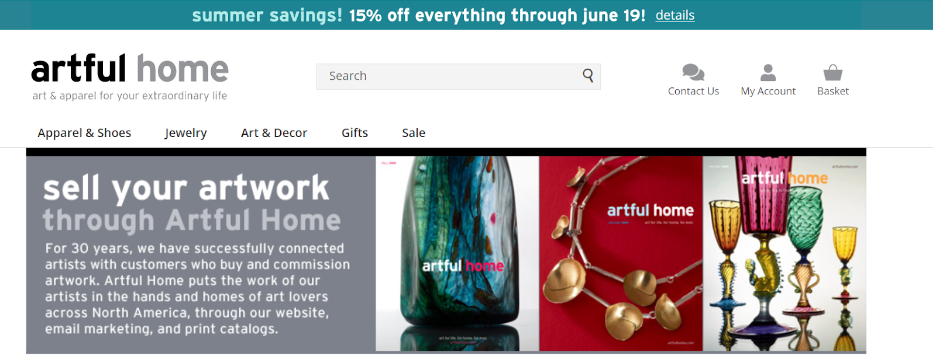
Bear in mind that Artful Home takes a 50% commission on any sales that they generate. Plus, you will get paid approximately 30 days after the ship date.
15. eBay
Needless to say that eBay is one of the biggest competitors of Etsy and sells almost everything. It has a larger audience than Etsy does. Furthermore, it is quite popular around the world.
Analyze Etsy vs eBay review in order to get the full perspective and discover the underlying factors that play an important role.
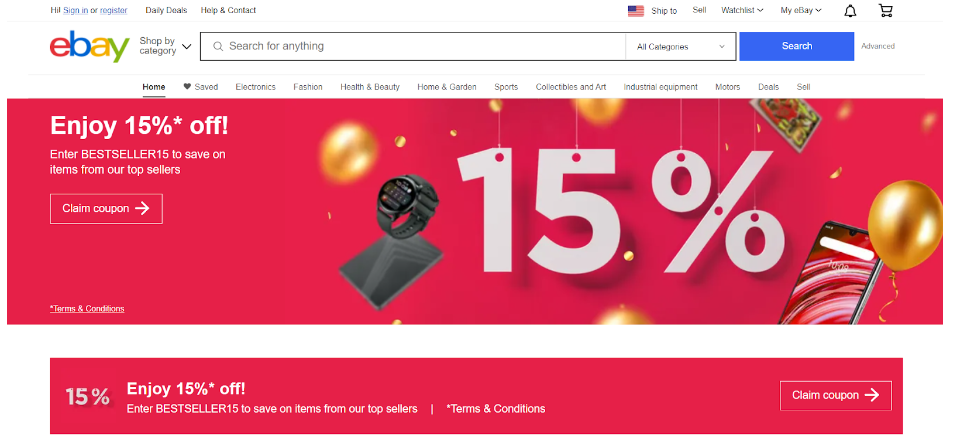
The consumer base is the first parameter to consider followed by shipping and costs. eBay seller fees and advertising costs are also significant in this regard. Finally, seller performance and tools provided to sellers are what help us to decide which platform is better.
16. UncommonGoods
The motivation behind this platform is clear by its name, right? The items displayed here are in a way environmentally friendly and fit the bill when it comes to designing recycled materials and using no part of animals.
Since there is a large volume of submissions for Uncommon Goods and they look for truly distinctive designs, it takes some time to get a response.
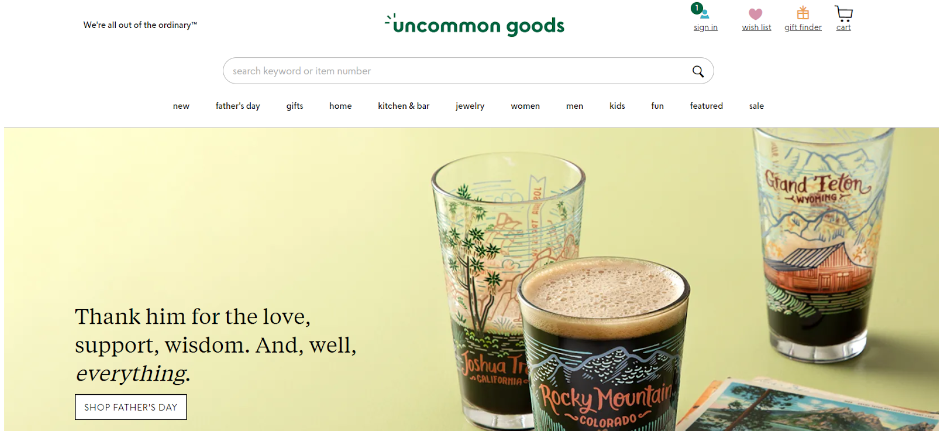
17. Spoonflower
It mainly caters to fabric, wallpaper, and home decor. Both sellers and shoppers follow a three-step process to make the purchase. It has many advantages for sellers when the items are resold.
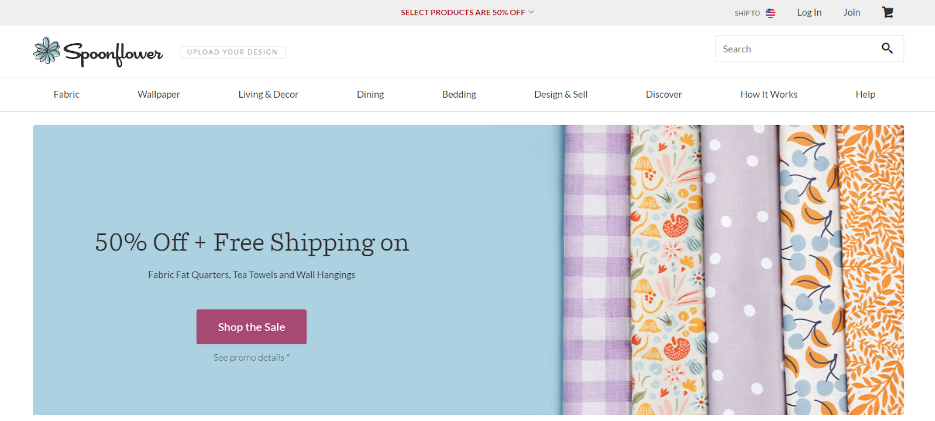
18. Icraftgifts
When the concept is gifted, it is high time to mention Icraftgifts, one of the best sites like Etsy. Personalized store management gives sellers an edge, allowing them to track sales as easy as possible.

Video to Top 18 Etsy Alternatives
How to Choose the Right Etsy Alternative?
Choosing the right Etsy alternative requires evaluating several key factors, including competition, product type, fees, and platform features.
Consider Product Fit: Some marketplaces specialize in handmade crafts, vintage items, or digital products. Pick one that matches your offerings.
Evaluate Fees and Costs: Compare listing fees, selling fees, and payment processing charges to ensure profitability.
Check Platform Features: Look for tools that support marketing, store customization, and analytics.
Assess Competition and Visibility: Consider how easy it is to stand out and gain exposure among other sellers.
Branding Opportunities: Determine whether the platform allows you to build a unique brand presence or if it’s more marketplace-focused.
FAQs
Is there a better alternative to Etsy?
Several platforms can serve as alternatives to Etsy, but the right choice depends on your business objectives. For those seeking complete control over the shopping experience, a customizable Shopify store is a strong option. On the other hand, marketplaces like eBay and Amazon Handmade let you sell without investing in website creation or heavy promotion.
Who is Etsy's biggest competitor?
Etsy’s biggest competitor is Amazon, particularly Amazon Handmade, which focuses on handcrafted and artisan products. Its main advantages include access to Amazon’s massive global customer base, trusted payment and fulfillment systems, and powerful marketing tools that help sellers reach a wider audience more easily than many smaller marketplaces.
Why are so many sellers leaving Etsy?
Many sellers are leaving Etsy due to rising fees, increased competition, and changes in the platform’s policies. High listing and transaction costs can cut into profits, while growing numbers of sellers make it harder to stand out. Additionally, some sellers are frustrated by Etsy’s algorithm updates, strict rules, and limited control over branding and customer relationships, prompting them to explore alternative marketplaces or build independent stores.
What is the best platform for handmade items?
The best platform for handmade items depends on your goals and business model. Etsy is ideal for most artisans and crafters because it’s a dedicated marketplace where buyers specifically look for unique, handcrafted products. Amazon Handmade is a strong alternative for sellers who want access to a massive audience and fulfillment support, making it easier to scale. For those focused on building a unique brand and having full control over their store, Shopify offers customization and marketing tools to create a branded shopping experience.
Is there a marketplace like Etsy with fewer fees?
Yes, Bonanza is a site like Etsy that charges no listing fees and only a 3.5% selling fee, making it a lower-cost alternative for sellers looking to reduce expenses while still reaching an online audience.
Final Thoughts on Similar Sites Like Etsy
Exploring these 18 sites like Etsy gives sellers a wide range of options to grow their businesses, reach new audiences, and find the platform that best fits their products and goals. Whether prioritizing lower fees, larger marketplaces, or more control over branding, there’s a suitable option for every creator. By diversifying where products are sold and experimenting with different platforms, sellers can maximize exposure, boost sales, and build a sustainable, long-term business beyond Etsy.



